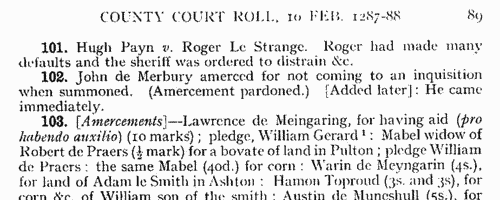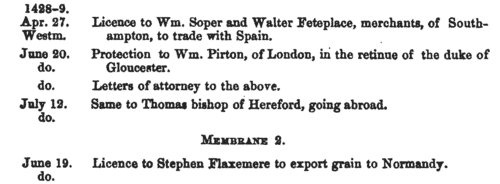Stanlowe Surname Ancestry ResultsOur indexes 1000-1999 include entries for the spelling 'stanlowe'. In the period you have requested, we have the following 18 records (displaying 1 to 10): Buy all | | | Get all 18 records to view, to save and print for £94.00 |
These sample scans are from the original record. You will get scans of the full pages or articles where the surname you searched for has been found. Your web browser may prevent the sample windows from opening; in this case please change your browser settings to allow pop-up windows from this site. Cheshire Court Rolls
(1259-1290)
Civil and criminal cases for most of Cheshire were handled by the county courts. Here we have the county court rolls for November 1259 to August 1260, December 1281 to September 1282, and December 1286 to September 1289. The city of Chester exercised its own jurisdiction, and here we have crown pleas and presentments from 1287 to 1297. The royal manor of Macclesfield in the east of the county had three independent jurisdictions - the hundred, forest and borough. Royal justices in eyre dealt with civil and criminal cases from the hundred and forest during their yearly visits, and here we have records from 1284 to 1290. Also covered by this index is an Inquest of Service in Time of War in Wales of 1288, listing knight's fees in the county. STANLOWE. Cost: £4.00.  | Sample scan, click to enlarge

| Cheshire Pleas
(1292)
Civil pleas for Cheshire were recorded in abbreviated Latin on parchment and sewn together in annual rolls, preserved at Chester castle until the 19th century, when they were removed to London. The great majority of these are unpublished: this is a transcript by David Bethell of the court's proceedings on Tuesday 9 December 1292. CHES 29/7STANLOWE. Cost: £8.00.  | Sample scan, click to enlarge

| Cheshire Pleas
(1293)
Civil pleas for Cheshire were recorded in abbreviated Latin on parchment and sewn together in annual rolls, preserved at Chester castle until the 19th century, when they were removed to London. The great majority of these are unpublished: this is a transcript by David Bethell of the court's proceedings on Tuesday 18 August 1293. CHES 29/7STANLOWE. Cost: £8.00.  | Sample scan, click to enlarge

| Cheshire Pleas
(1293)
Civil pleas for Cheshire were recorded in abbreviated Latin on parchment and sewn together in annual rolls, preserved at Chester castle until the 19th century, when they were removed to London. The great majority of these are unpublished: this is a transcript by David Bethell of the court's proceedings on Tuesday 14 April 1293. CHES 29/7STANLOWE. Cost: £8.00.  | Sample scan, click to enlarge

| Cheshire Pleas
(1293)
Civil pleas for Cheshire were recorded in abbreviated Latin on parchment and sewn together in annual rolls, preserved at Chester castle until the 19th century, when they were removed to London. The great majority of these are unpublished: this is a transcript by David Bethell of the court's proceedings on Tuesday 3 March 1293. CHES 29/7STANLOWE. Cost: £8.00.  | Sample scan, click to enlarge

| Close Rolls
(1313-1318)
The close rolls of the 7th, 8th, 9th, 10th and 11th years of the reign of king Edward II record the main artery of government administration in England, the orders sent out day by day to individual officers, especially sheriffs of shires: they are an exceptionally rich source for so early a period. In amongst this official material, the rolls were also used as a way of recording many acknowledgments of private debts and contracts between individuals. Most of the contents relate to England, but there are also entries concerning Wales, Scotland, Ireland and the English possessions in France.STANLOWE. Cost: £4.00.  | Sample scan, click to enlarge

| Fine Rolls
(1356-1368)
The close rolls of the 30th to 42nd years of the reign of king Edward III record part of the government administration in England, with orders sent out day by day to individual officers, and commitment of particular responsibilities and duties. There is also some material relating to Wales, Scotland, Ireland and the English possessions in France. STANLOWE. Cost: £4.00.  | Sample scan, click to enlarge

| Payments by the English crown
(1370)
The Exitus or Issue Roll of the Exchequer, compiled by the Clerk of the Pell, recorded all issues or payments made by the English crown: presents of plate and jewellery to foreign nobility; household payments to officers and servants; wardrobe payments; alms; payments for the upkeep of royal palaces, manors, residences and chapels; repayments of loans to the king; payments to messengers and couriers; wages of mercenaries; the upkeep of the navy; ransoming of hostages; maintenance of castles, forts, garrisons and fortifications; salaries of judges and other officers of the courts of Chancery, Exchequer, King's Bench and Common Pleas; as well as a host of miscellaneous other items. This is a translation of the text of the roll for the 44th year of the reign of king Edward III, when Thomas de Brantingham, Bishop of Exeter, was Lord High Treasurer of England.
STANLOWE. Cost: £4.00.  | Sample scan, click to enlarge

| Fine Rolls
(1377-1383)
The fine rolls of the 1st to 6th years of the reign of king Richard II record part of the government administration in England, with orders sent out day by day to individual officers, and commitment of particular responsibilities and duties. There is also some material relating to Wales, Scotland, Ireland and the English possessions in France. STANLOWE. Cost: £4.00.  | Sample scan, click to enlarge

| The English in France
(1425)
King Henry VI of England (one of the grandsons of Charles VI of France) claimed the throne of France (and quartered the fleurs-de-lis of France with the lions of England on the royal standard) as had his predecessors since Edward III, as descendants of Philip IV of France. The English had real power or influence in Brittany, Normandy, Flanders and Gascony, and actual possession of several coastal garrisons, in particular Calais, where the French inhabitants had been replaced by English. Henry VI came to the throne only seven years after his father had trounced the French at Agincourt; but his cousin, Charles VII, who became king of France in the same year, spent his long reign rebutting the English king's claim to his throne by territorial reconquest and consolidation. The English administration kept a series of records called the French Rolls. On these are recorded royal appointments and commissions in France; letters of protection and safe-conduct to soldiers, merchants, diplomats and pilgrims travelling to France from England and returning, and to foreign legations. There are also licences to merchants to export to the Continent, and to captains to transport pilgrims. As Henry VI's reign progressed, and the English grip on northern France loosened, the French Rolls also increasingly include entries concerning the ransoming of English prisoners.STANLOWE. Cost: £6.00.  | Sample scan, click to enlarge

|
| 1 | 2 |  |
Research your ancestry, family history, genealogy and one-name study by direct access to original records and archives indexed by surname.
|












